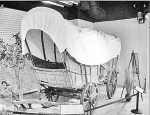- Research tips and McCook Brick Company- solid as a brick (12/16/24)
- Big Give appreciation and some railroad characters (11/15/24)
- George Randel becomes a landowner, gets married, and takes in a Buffalo Bill show (9/20/24)
- The memoirs of George F. Randel, early settler of Red Willow County (9/12/24)
- Vietnam War Memorial honors Nebraskans who served (6/13/24)
- McCook business promotions - just prior to 1893 stock market crash (5/30/24)
- Shall we dance? Meet you at the Gayway (12/8/23)
Settlers surge west to McCook area in 1886
Friday, August 9, 2019

Courtesy
The Prairie Schooner was much different than the Conestoga wagons typically depicted in pioneer movies. It was lighter and thinner, with the noted white canvas top the only thing visible above the tall prairie grass, giving the impression of a ship skimming a sea of grass.
As is always true, families that live miles apart get together for funerals and last week as we said goodbye to Steve, we had people from Virginia, California, Arkansas, Colorado gathered together for what became a determined goal of making a family reunion a yearly occurrence. Since McCook is the halfway point for most, and the lake, which Steve loved to visit, a draw for all, we will gladly welcome them all back each year for a celebration of family.
While our California nephews were enjoying fishing on the pond, I took a moment to explain what the “tall grass” plains looked like when the settlers saw Nebraska for the first time. This year’s rainy spring produced an abundance of grasses nearly five-foot-tall on our land, IE., tall grass, which were swaying as if ocean waves in the breeze.
The settlers, traveling in prairie schooners (far lighter than the Conestoga wagons we often see depicted in movies) truly created the picture of ships sailing in a sea of grass. That vison made me wonder how late into the 1800’s our forefathers actually came to southwest Nebraska in those wagons.
From the McCook Tribune, March 11, 1886: “The prairie schooner, with white top and protruding stove pipe, is again a familiar and oft seen sight, harbingers of the restless immigration now surging up the Great Republican Valley.”
McCook was 4 years old in 1886 and struggling with all the problems surrounding creating a livable town in the middle of no-where. Buildings were going up at a remarkable rate, patrons were demanding sidewalks to raise them up out of the mud and dirt making up the streets and store front entrances. Arguments had risen over how to form a city government and the land office was parceling lots for the expected surge of residents.
“It looks like old times to see the passengers crowding off the train at this station, as they are wont to do, these days. The rush west of here is so great that an extra coach is ran on No. 1 (passenger train) as far west as Akron.” McCook Tribune, March 11, 1886.
The McCook Hotel made the news in the same paper: “We are informed that the present lessees of the McCook Hotel have been given notice to vacate, and that Mr. Rockwood, who is now running the fruit stand in the old B. & M. Pharmacy building, will in due time take charge of the hotel. We take great satisfaction in announcing this fact, for under its’ resent management the house has been anything but a credit to our town but rather an eyesore for every law-abiding citizen.”
Three items caught my eye in the Tribune’s October 11, 1886 issue: “Don’t be afraid if you see Deputy Sheriff Bennett coming after you. Dr. Kay (a renown McCook physician) has placed his accounts in the hands of the deputy, who is rustling after the doctor’s creditors in dead earnest, that’s all.”
When you read this item, think about how much money the reward represented in 1886: “I will give $200 reward for information leading to the conviction of the parties who have been stealing and maiming calves in my pasture southeast of McCook. A. W. Corey”
Finally, the Red Willow Co. Bank had this advertisement: “No need of waiting to send off applications. (For Farm Loans) Money paid over as soon as papers are completed. Call on or address, Red Willow Co. Bank, Indianola, Neb.”
Our website has been updated to make searching easier. Give it a try at: www.swngs.org.

